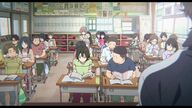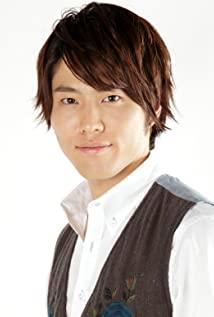Keywords: Mutual change.
Ishida went from being a bully to taking the initiative to help Nishinomiya. It was an atonement, but it was a one-sided fight. The change was not enough, and it needed to become cooperative help. Nishinomiya went from a passive helper to an active helper. If a person only accepts help and does not give back to others, he will only feel that he is a waste and a burden for a long time. Nishimiya has always taken the initiative to admit his fault when he was in trouble before, even if the fault was not his own, it was because she always felt that it was her own fault. She hates herself very much, and when she dares to accept help and give back to others, she will start to like herself. Her change came from taking the initiative to unite with everyone after committing suicide, unraveling everyone's heart. Imagawa's change has changed from throwing the pot, green tea, and complaining about Ishida to actively helping Ishida to pray for blessings with origami cranes. Her change also started with Nishinomiya uniting them. The short-haired girl was cowardly and timid since she was a child, and she retreated when she was in trouble. Although she did not bully Nishinomiya at the beginning, she also failed to stand up to protect her. When Nishinomiya broke up on the bridge before committing suicide, everyone was hit by Ishida's pain point. At that time, everyone was still the same as when they were children. It wasn't until Nishinomiya later united them to make a change that everything changed. Ueno has always been a person who said something since she was a child. She thought that everyone should be like this. Whoever is wrong will admit it. He is domineering and arrogant, so when facing Nishinomiya, it is very disgusting to admit that he is wrong. She feels that if she is wronged and scolded by others, If she was bullied, she should fight back, but Nishinomiya didn't, so she always felt that Nishinomiya was disgusting. It was not until Nishinomiya called Ueno's "idiot" back on the day of the cultural festival that the two finally released their suspicions.
Many people say that the film tells the story of bullies who get lost and find their way back. Why? I think it's still too one-sided. In "One Liter of Tears", since the heroine fell ill, the classmates were very willing to help, but after a long time, it affected the progress of study and life, and everyone began to complain and complain about the heroine. This has nothing to do with hypocrisy, it is human nature.
Nishinomiya's mother is reluctant to admit that Nishinomiya is a disabled person, and she insists on sending her to a school for normal people. The risk of being misunderstood and bullied is very high. If her daughter is accommodated and cared for and cannot respond, she will feel very sorry for herself. Yes, because the interaction between people should be mutual help and happiness. Only unilateral efforts are not rewarded. The giver feels aggrieved, and the receiver also blames and annoys himself. In life, the truly disabled people want to support themselves, instead of accepting social donations all the time, and not giving them the opportunity to support themselves is precisely annihilating their dignity as human beings.
In a family, if a person only cooks food and does not make money, after a long time, not only the family will despise him, but even himself will despise and hate himself. I have personally experienced that when I can't make money, I not only have no confidence in spending money, but also have no confidence in arguing. Kafka's "Metamorphosis" is the same story.
Regardless of physiological conditions, a normal person should be able to actively accept help and at the same time give back help. If you are beaten, scolded or bullied, you should take the initiative to fight back, especially among friends. Nishinomiya's problem is that she is too polite to her friends and cowardly to her enemies. Even if they couldn't fight, there were other ways to fight back, but Nishinomiya didn't do it. Nishinomiya's mother is very strong and does not want to admit that her daughter is disabled. If she insists on putting Nishinomiya in a school for normal people, she should let Nishinomiya gain confidence and courage like a normal person. If not, she should admit that the disabled school is more suitable for her.
As a bully, Ishida, after empathizing with him, wanted to atone for his sins, help Nishinomiya cheer up, and like himself, but his method was unilateral and subjective, and his method was blunt, making it difficult for Nishinomiya to refuse, but also Not much effect. A person will fall in love with himself only when he accepts himself both internally and externally. Her acceptance originated from those who used to be close to her and then bullied her when she was a child: the short-haired girl, Imagawa and Ueno, Ishida was not included, he was just a guide A person, a person who pushes his own actions. After getting acquainted with Ishida, Nishinomiya finally proposed to find a girl with short hair. Next, Imagawa and Ueno were strung together. In the end, it is the story of everyone being redeemed. Those who were bullied were redeemed, and those who were bullied gained dignity and fell in love with themselves.
If the bullies are all punished and tried, the empathetic audience is cool, but it doesn't solve Nishinomiya's problems. Nishinomiya still feels that she is a waste, a burden, still hates herself, or may commit suicide, because she has never been able to allow herself to accept the help and love of others calmly, and she does not feel that she has the ability to give back to each other.
View more about A Silent Voice: The Movie reviews











